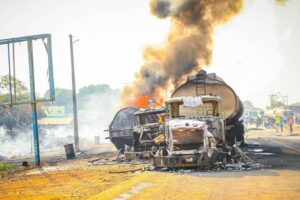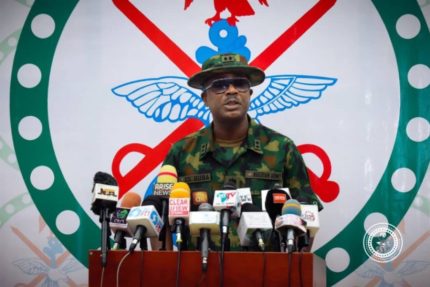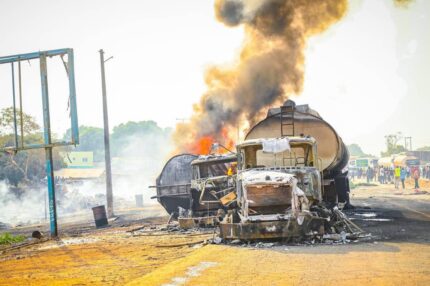The Nigerian Defence Headquarters has confirmed the presence of a new terrorist group, the ‘Lukarawas,’ intensifying security concerns across the Northwest. This announcement, delivered by Maj.-Gen. Edward Buba, the Director of Defence Media Operations, highlights the growing infiltration of these militants into Nigeria following the recent political unrest in neighboring Niger. The group’s emergence presents a fresh security challenge, particularly in remote and hard-to-govern areas that have already faced severe unrest from various insurgent groups.
During a press briefing in Abuja on November 7, 2024, Maj.-Gen. Buba disclosed that the Lukarawas began their incursion into northern Nigeria shortly after the military coup in Niger. This upheaval, which led to the suspension of constitutional governance in Niger, has disrupted long-standing security cooperation between Nigerian and Nigerien forces. As a result, the Lukarawas have seized the opportunity to exploit gaps along the border, making targeted incursions primarily into Sokoto and Kebbi states.
Unintended Support from Local Communities of Lukarawas
According to Maj.-Gen. Buba, local communities in northern Nigeria initially extended support to the Lukarawas, mistakenly interpreting their presence as peaceful. “The group was accommodated by the locals who initially thought that the group meant well for them,” Buba explained, emphasizing that this misperception allowed the group to establish itself more deeply within these communities. The terrorists have capitalized on this goodwill to strengthen their operations and influence across affected areas.
To counter this growing threat, the Nigerian military has intensified its Intelligence, Surveillance, and Reconnaissance (ISR) operations aimed at tracking and neutralizing Lukarawas members. Military officials also noted that these efforts have already led to the identification of several hotspots where the Lukarawas are believed to be active. Despite this, the group’s ability to hide in vast under-governed territories presents a significant challenge to security forces.
Exploiting Nigeria’s Remote and Under-Governed Areas
One of the major challenges posed by the Lukarawas is their strategic use of Nigeria’s extensive, under-governed regions in the Northwest. These areas, characterized by difficult terrain and limited state presence, allow militants to evade detection and continue their activities relatively unchecked. “The terror group has continued to take advantage of the vast under-governed areas to hide and evade troops as well as harass the locals,” Maj.-Gen. Buba stated, stressing the challenges that Nigeria’s security forces face in patrolling these regions effectively.
The Defence Headquarters warned that the Lukarawas pose a significant risk to civilian safety and stability in the Northwest. Efforts to strengthen military presence in these remote areas have been challenged by both the group’s evasive tactics and the limited infrastructure for sustained military operations. Nevertheless, Maj.-Gen. Buba assured that the Nigerian military is committed to dismantling the group’s influence and restoring security to affected communities.
Niger Coup’s Role in Weakening Border Security
The emergence of the Lukarawas is intricately linked to the political instability that has gripped Niger since the July 26, 2023, military coup. This coup, which led to the arrest of Niger’s President Mohamed Bazoum and the installation of a military junta, has undermined the joint security efforts previously conducted by Nigerian and Nigerien forces along their shared border. Before the coup, both nations coordinated anti-terrorism operations, curbing the activities of insurgent groups across the region.
Since the coup, however, cross-border security cooperation has suffered a significant breakdown, allowing groups like the Lukarawas to exploit weakened border controls. The Nigerian military has voiced concerns about the increasing threats from armed groups in the Northwest, given the current limitations in joint operations. Security analysts emphasize the need for restored cooperation or alternative security measures to address these border vulnerabilities, which, if left unchecked, could deepen the region’s instability.
Table of Contents
Discover more from OGM News NG
Subscribe to get the latest posts sent to your email.














